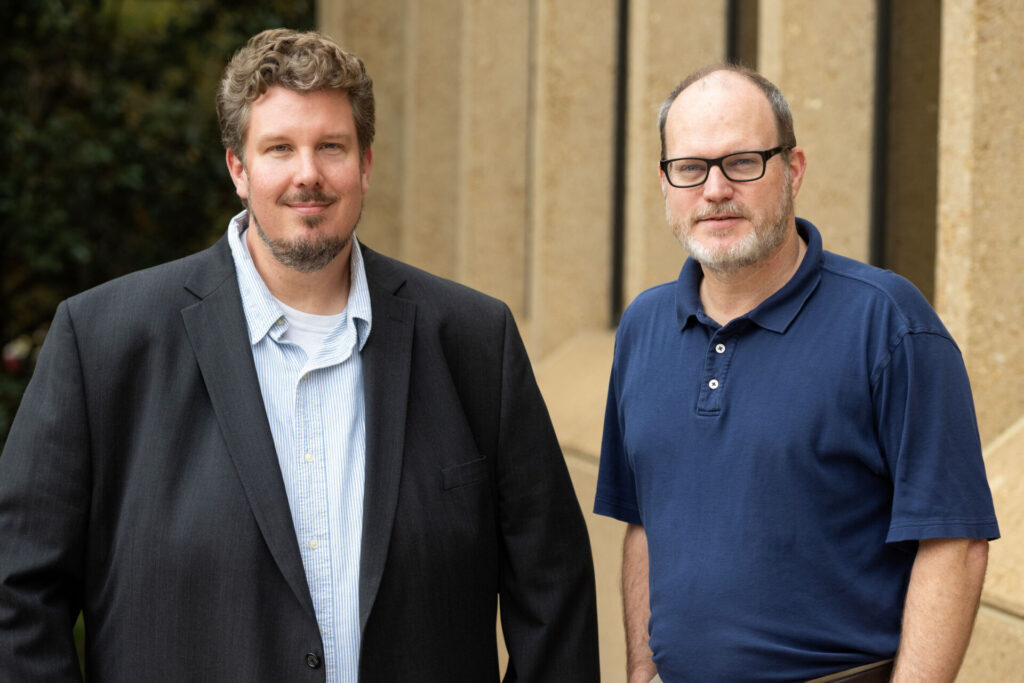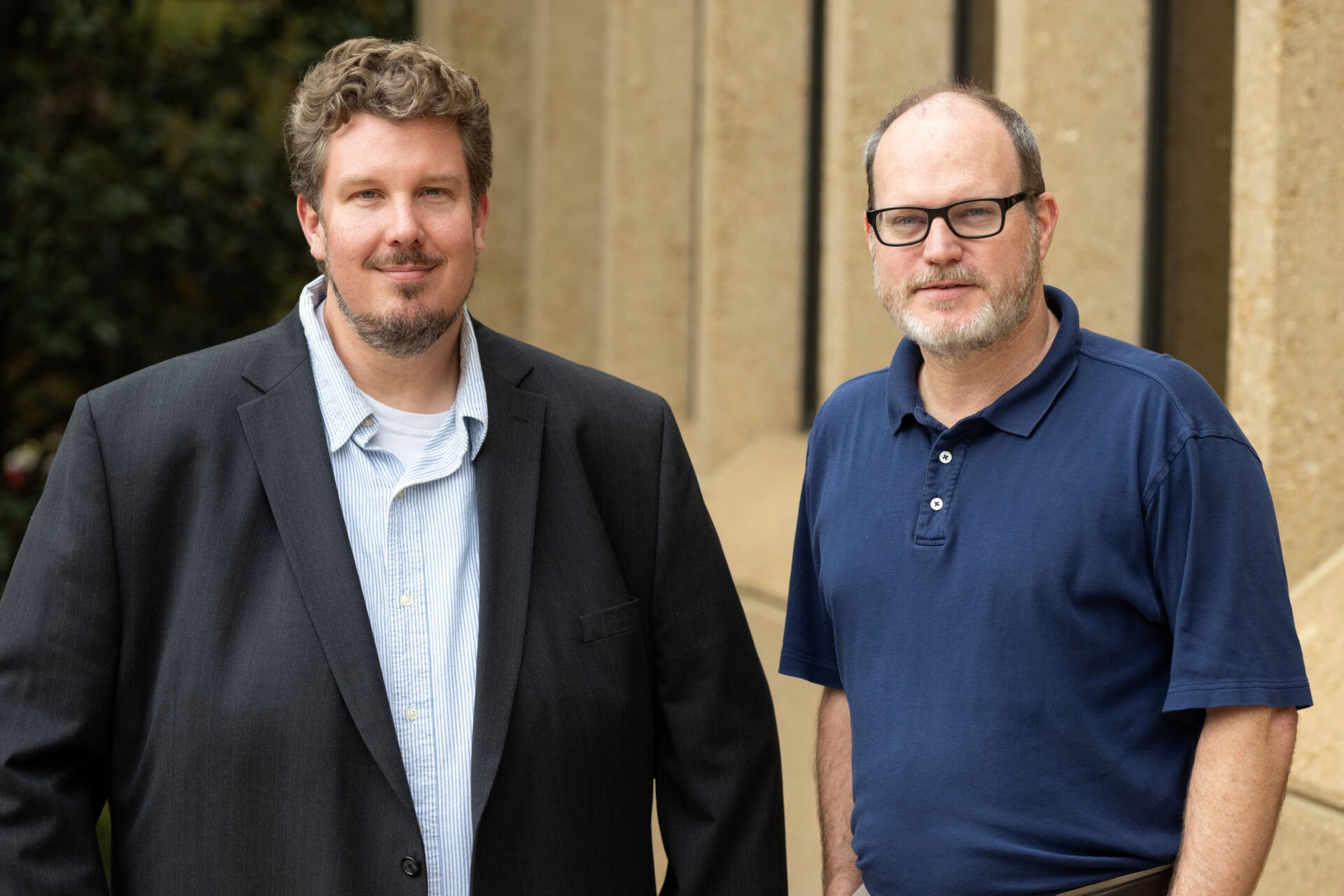By Erin Garrett
University Communications

When generative artificial intelligence first emerged, three faculty members in the Department of Writing and Rhetoric at the University of Mississippi were fascinated, intrigued and concerned.
“I initially encountered it in April of 2022,” said Robert Cummings, associate professor of writing and rhetoric. “I saw a presentation by a team of researchers at Stanford who were going to try to envision what we’re living with now, which is word processors that are enabled with generative AI output.
“Then I saw a book written entirely by generative AI. That was a wakeup call for me – it was written in six hours and published on Amazon.”
Cummings, along with Marc Watkins, academic innovation fellow and lecturer in composition and rhetoric, and Stephen Monroe, chair and associate professor of writing and rhetoric, quickly realized the impact that this emerging technology would have on their field. Without hesitation, they began developing and fine-tuning strategies for colleagues and students to tackle this new writing landscape.
With the launch of ChatGPT in late 2022, generative AI exploded onto the scene, taking over social media chatter, news articles and talk shows. The ability of the platform to automatically generate text based on prompts was unlike anything seen before.
Educators are trying to keep up with this fast-paced technology as they learn to navigate issues surrounding tools such as ChatGPT in the classroom.
Generative AI presents numerous challenges, including plagiarism, “hallucinations” and data privacy. For higher education institutions, worries of cheating and diminishing critical thinking skills abound.
“There is a very treacherous path ahead filled with massive ethical issues,” Watkins said. “Tech companies are deploying these tools as quickly as they can without considering their potential use.”
In August 2022, writing and rhetoric faculty members began testing AI-powered assistants in their first-year writing courses. This allowed them to build their knowledge base to assist others on campus.
Monroe coined the department’s AI philosophy, “Explore, don’t panic.”
“Our faculty in the DWR are realistic and care first and foremost about our students,” Monroe said. “We decided to engage this new technology right away, even though many of us were worried about its disruptive power.
“AI literacy is suddenly an essential skill, and I’m proud of our faculty for adapting so quickly.”
Cummings created the “DEER” approach to guide their work to build student assignments that utilize AI:
- D – Clearly define the stages of the project and describe how each stage will affect student learning outcomes
- E – Evaluate a specific AI technology to pair with the learning activity in each stage
- E – Encourage students to explore that technology for that stage
- R – Allow space for reflection.
“From the assignments we started developing in the fall of last year, we gathered 100,000 words of student reflections,” Watkins said. “We found that students explored the tools tentatively and responsibly. Some of them ultimately decided to not use AI at all.”
Educators nationwide began taking note. Cummings, Monroe and Watkins have been quoted in articles appearing in the Chronicle of Higher Education, Inside Higher Ed and the Washington Post. They have presented the AI working group’s findings at conferences and consulted with colleagues at other institutions.
Watkins recently published an article on the research in a peer-reviewed collection of essays and assignments about teaching with AI.
This summer, the department hosted the AI Summer Institute for Teachers of Writing. The two-day workshop trained nearly two dozen educators in best practices for incorporating generative AI into their courses.
Participants left with skills to develop educational applications and policies for proactive use of AI, as well as the ability to teach students to use AI tools and evaluate generated content.
Cummings has chaired an AI task force for the university since 2022. The group was formed to coincide with the SEC Artificial Intelligence Consortium.
“The AI task force encompasses everything that we are trying to do at the university that engages AI,” Cummings said. “It brings together the teaching and research community and the grant-making community as well. Those three functions are combined to try to raise awareness of AI so that different fields can use it.
“We’re also able to highlight work that people are doing in this area. It fires up the imagination of everyone who attends.”
Monroe, Watkins and Cummings agree that biggest challenge with AI is the rapid development of the technology.
“The tools are evolving so quickly,” Cummings said. “In addition to text, there are image generators, video, audio – the range of rhetorical questions that our students are being asked to make are multiplying.”
The technology also offers opportunities, Monroe said. He praises the Ole Miss department for looking at both the positives and negatives of generative AI.
“We have an innovative group of faculty who are thinking pragmatically about AI in the classroom,” he said. “Teachers like Guy Krueger, Angela Green, Chad Russell, Andrew Davis, Emily Donahoe, Colleen Thorndike and Brian Young – experienced faculty creating brand-new learning opportunities for UM students.
“It’s a brilliant and inventive team.”
The department will continue to identify generative AI tools and develop meaningful ways to incorporate them in the academic writing process, Cummings said.
“This is a shift in literacy – this is, a shift in what it means to read and write,” he said. “There’s no way to underestimate the effects when we take humans out of the loop of text creation.
“Prior to April 2022, if I was given a piece of text, I would not question whether a human wrote it. People wrote whatever text I was reading somewhere down the line, and now that’s changed.
“It’s going to take time for our brains to shift, and we have to prepare our students to work in that world.”


